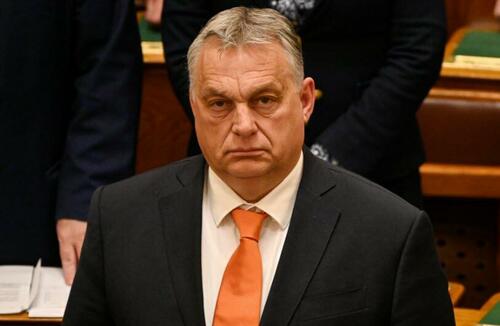
Authored by Thomas Brooke via Remix News,
Constant attacks of the Hungarian government from U.S. Democrats do little to differentiate the U.S. from the bullying superpowers it seeks to distance itself from...
The relentless criticism by the Biden administration towards the incumbent Hungarian government is entirely disproportionate and unjustified, and does little to separate the current U.S. regime from the malign superpowers it seeks to distance itself from. Hungary’s leader recognizes this and is putting his own country’s interests ahead of those of the United States, a stance that Europe would be wise to follow.
Despite pressure from the U.S., Hungarian Prime Minister Viktor Orbán said his country cannot be pushed into joining the war on the side of Ukraine.
“The United States has not given up its plan to squeeze everyone, including Hungary, into a war alliance, to go with the crowd,” Orbán told a press conference last week.
“But I have made it clear several times, and Hungarian diplomacy has also expressed this, that the will of the Hungarian people is clear, and our knowledge of history is quite solid, so we will not allow this.
“We will not allow them to squeeze us into a war. We will not send any weapons, and we will not be involved in a conflict that is not our war,” the Hungarian premier added.
Orbán made the remarks amid growing tension with the U.S. Recent disparaging remarks by David Pressman, Biden’s top diplomat in Budapest, have been dismissive of a country which, whilst remaining on many issues a conforming ally to the United States, has had the audacity to form its own view on matters unfolding on its doorstep, and opted not to become entirely subservient to U.S. interests when the two countries have vastly different worldviews and face inherently different geopolitical threats
“We have concerns about the continued eagerness of Hungarian leaders to expand and deepen ties with the Russian Federation, despite Russia’s ongoing brutal aggression against Ukraine and threat to transatlantic security,” Pressman told a news conference in Budapest last week after criticizing the Hungarian government for retaining its stake in Russia’s International Investment Bank (IBB) upon which the U.S. government imposed sanctions last week.
Hungarian Prime Minister Viktor Orbán berated the shortsightedness of the U.S. decision on state radio, explaining that the Russian-controlled financial institution based in Budapest “could have played a serious role in developing Central European economies,” and expressed concern that the United States simply doesn’t understand the geopolitical climate and should stop acting like it does.
The Hungarian government withdrew its membership of the IBB the day after the sanctions were imposed, with Orbán stating the U.S. action had rendered the bank’s operations impossible.
“It can’t serve its function,” Orbán said. “We decided that under these circumstances, Hungary’s participation in the bank’s further work has become pointless.”
It’s not the first time the Hungarian government has been frustrated by decisions made in far-away Washington without an understanding of the nuanced consequences for the region.
U.S. government officials have regularly criticized the Hungarian administration for not following suit with the U.S. approach to the conflict in Ukraine, criticism which the Hungarian premier considers to be misguided.
“When I hear about nuclear weapons, or that a Western European country is taking depleted uranium weapons to Ukraine, I think of Chernobyl,” Orbán said while referring to Britain’s decision to send depleted uranium tank ammunition to Ukrainian forces.
“An American would never think of this, but we know that if something happens in Ukraine it’s best if people don’t go out into the streets, so we know what happened then.
“Or if in America they hear that someone died on the Ukrainian-Russian front, they obviously sympathize because it’s a loss, but it is not the same feeling as ours, because I immediately think that the person who died could be a Hungarian person from Transcarpathia.
“Everything that happens there becomes a part of our lives that very day.
“The dimension of the Americans is quite different, so I say that we rightly expect the United States to take note of Hungary’s special situation, its proximity to Ukraine, and to understand that we are therefore on the side of peace and want to stay there.”
Given the continued animosity from the U.S. towards the Orbán administration, it could be assumed that Hungary was an active belligerent nation in the conflict, and yet Budapest has complied with every anti-Russian sanction approved by the European Union, despite voicing its opposition to these actions.
“We have never agreed with sanctions, but we do not dispute anyone’s right, including the United States to impose sanctions if they see fit. We acknowledge these sanctions and roll with them,” Orbán said recently.
Hungary has welcomed tens of thousands of Ukrainian refugees and provided humanitarian aid to Kyiv and the affected areas, and it has denounced the Russian invasion of Ukraine from day one.
As is its right, Budapest has maintained its neutrality with regard to military intervention and assistance, and has refused to change its stance despite U.S. protestations.
Orbán added that his administration is mature enough to retain the longstanding Hungarian-U.S. alliance despite a difference in approach to the conflict in Ukraine.
“The American-Hungarian friendship must endure this difference of opinion,” he stated last week.
Whether Joe Biden and his politically-appointed diplomat in Budapest is willing to accept a difference of opinion and move on remains to be seen.
However, if the recent anti-Russian poster campaigns dotted across Hungary with the support of the U.S. embassy are anything to go by, it is difficult to see a reconciliation in the immediate future between the two countries, at least not while Joe Biden’s Democrats remain in the White House.
Authored by Thomas Brooke via Remix News,
Constant attacks of the Hungarian government from U.S. Democrats do little to differentiate the U.S. from the bullying superpowers it seeks to distance itself from…
The relentless criticism by the Biden administration towards the incumbent Hungarian government is entirely disproportionate and unjustified, and does little to separate the current U.S. regime from the malign superpowers it seeks to distance itself from. Hungary’s leader recognizes this and is putting his own country’s interests ahead of those of the United States, a stance that Europe would be wise to follow.
Despite pressure from the U.S., Hungarian Prime Minister Viktor Orbán said his country cannot be pushed into joining the war on the side of Ukraine.
“The United States has not given up its plan to squeeze everyone, including Hungary, into a war alliance, to go with the crowd,” Orbán told a press conference last week.
“But I have made it clear several times, and Hungarian diplomacy has also expressed this, that the will of the Hungarian people is clear, and our knowledge of history is quite solid, so we will not allow this.
“We will not allow them to squeeze us into a war. We will not send any weapons, and we will not be involved in a conflict that is not our war,” the Hungarian premier added.
[embedded content]
Orbán made the remarks amid growing tension with the U.S. Recent disparaging remarks by David Pressman, Biden’s top diplomat in Budapest, have been dismissive of a country which, whilst remaining on many issues a conforming ally to the United States, has had the audacity to form its own view on matters unfolding on its doorstep, and opted not to become entirely subservient to U.S. interests when the two countries have vastly different worldviews and face inherently different geopolitical threats
“We have concerns about the continued eagerness of Hungarian leaders to expand and deepen ties with the Russian Federation, despite Russia’s ongoing brutal aggression against Ukraine and threat to transatlantic security,” Pressman told a news conference in Budapest last week after criticizing the Hungarian government for retaining its stake in Russia’s International Investment Bank (IBB) upon which the U.S. government imposed sanctions last week.
Hungarian Prime Minister Viktor Orbán berated the shortsightedness of the U.S. decision on state radio, explaining that the Russian-controlled financial institution based in Budapest “could have played a serious role in developing Central European economies,” and expressed concern that the United States simply doesn’t understand the geopolitical climate and should stop acting like it does.
The Hungarian government withdrew its membership of the IBB the day after the sanctions were imposed, with Orbán stating the U.S. action had rendered the bank’s operations impossible.
“It can’t serve its function,” Orbán said. “We decided that under these circumstances, Hungary’s participation in the bank’s further work has become pointless.”
It’s not the first time the Hungarian government has been frustrated by decisions made in far-away Washington without an understanding of the nuanced consequences for the region.
[embedded content]
U.S. government officials have regularly criticized the Hungarian administration for not following suit with the U.S. approach to the conflict in Ukraine, criticism which the Hungarian premier considers to be misguided.
“When I hear about nuclear weapons, or that a Western European country is taking depleted uranium weapons to Ukraine, I think of Chernobyl,” Orbán said while referring to Britain’s decision to send depleted uranium tank ammunition to Ukrainian forces.
“An American would never think of this, but we know that if something happens in Ukraine it’s best if people don’t go out into the streets, so we know what happened then.
“Or if in America they hear that someone died on the Ukrainian-Russian front, they obviously sympathize because it’s a loss, but it is not the same feeling as ours, because I immediately think that the person who died could be a Hungarian person from Transcarpathia.
“Everything that happens there becomes a part of our lives that very day.
“The dimension of the Americans is quite different, so I say that we rightly expect the United States to take note of Hungary’s special situation, its proximity to Ukraine, and to understand that we are therefore on the side of peace and want to stay there.”
Given the continued animosity from the U.S. towards the Orbán administration, it could be assumed that Hungary was an active belligerent nation in the conflict, and yet Budapest has complied with every anti-Russian sanction approved by the European Union, despite voicing its opposition to these actions.
“We have never agreed with sanctions, but we do not dispute anyone’s right, including the United States to impose sanctions if they see fit. We acknowledge these sanctions and roll with them,” Orbán said recently.
Hungary has welcomed tens of thousands of Ukrainian refugees and provided humanitarian aid to Kyiv and the affected areas, and it has denounced the Russian invasion of Ukraine from day one.
As is its right, Budapest has maintained its neutrality with regard to military intervention and assistance, and has refused to change its stance despite U.S. protestations.
Orbán added that his administration is mature enough to retain the longstanding Hungarian-U.S. alliance despite a difference in approach to the conflict in Ukraine.
“The American-Hungarian friendship must endure this difference of opinion,” he stated last week.
Whether Joe Biden and his politically-appointed diplomat in Budapest is willing to accept a difference of opinion and move on remains to be seen.
However, if the recent anti-Russian poster campaigns dotted across Hungary with the support of the U.S. embassy are anything to go by, it is difficult to see a reconciliation in the immediate future between the two countries, at least not while Joe Biden’s Democrats remain in the White House.
Loading…






